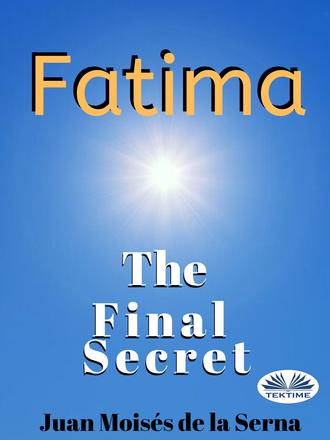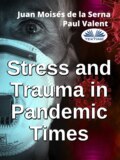
Dr. Juan Moisés De La Serna
Fatima: The Final Secret
“No, this way is faster.”
When it was served to us, she started drinking it immediately. I saw that the coffee was steaming and I asked her:
“Are you in such a hurry that you can’t wait for it to cool down a little?”
“Wait, you’ll see,” she said, smiling, and she did not say another word.
She drank all the coffee that was left in the cup in a single sip. I don’t know how she could tolerate it and not burn her throat, because there was no one who could have drank mine at least like that, it was just too hot.
Indicating with her hand that I should hurry, she headed for the exit, so my full coffee was left untouched in the cup. I did not want to burn myself, besides, curiosity had already gripped me. What could Pilar want to show me that would suddenly make her hurry so much?
I followed her out of the coffee shop, and of course because she knew where she was going, her steps were firm, yet I didn’t understand anything and I looked all around me, and before I knew it, we had arrived at the University library. She immediately greeted the two people at the door, it was obvious that they were old acquaintances.
“Hello Pilar! Here for information again?” asked one of them.
“Yes!” she answered. “I know you’ve received something interesting, and I’m going to keep an eye on it.” We kept walking until we got into a big room.
“I’d never come here before,” I said looking at the place. “I’d visited the public library, yes, who in Santiago de Compostela doesn’t know it? This place though, I didn’t even know it existed. Where are we?” I asked.
She smiled at me softly:
“Shhhh! You can’t talk here.”
I shrugged a little embarrassed, because for a few moments I’d forgotten that talking is prohibited in libraries. Of course, given all the time I’ve spent in them, I was almost always alone, so I didn’t have to make any effort to keep quiet. Since I didn’t have anyone to talk to, how was I going to do it?
At that moment, I don’t know why, I remembered one time when I was occupying myself with a book that I had in my hands in the Vatican library, and that nun approached me and asked me:
“Can I help you?” and I immediately realized that she had asked in English.
I looked at her surprised and thought, “How strange! Why have you asked me like that?” Then I answered:
“No, thank you.” I was of course trying to pronounce it properly, in the same language that she had spoken to me, English. It’s a problem that I’ve always had, even though my teachers have always told me:
“Manuel, you know how to assert yourself very well,” but when I’ve had to speak it, I’ve always been indecisive, fearing that the person who was listening to me wouldn’t understand me, because I was pronouncing things wrong.
The nun gave me a pamphlet, and turning around, disappeared into the aisles of the place. Surprised, I looked at what she had given me, I opened that pamphlet to see what it was when I saw in large letters, “FATIMA.”
I got up as if propelled by a spring to look for her, but it was useless. There were a lot of people sitting there, priests, the odd nun, and I looked at them closely, to see if the nun who had spoken to me was among them.
But nothing! I couldn’t recognize her because I’d not taken notice of how she was dressed, and here there were different uniforms, or habits as I believe their clothes are called, some dressed in blue, others in black, still others in white, which surprised me. What would they be doing here? Why were they not at their convents?
Well, since it was none of my business, I let it go. Since the pamphlet was in my hand, I looked at it more closely. It was written in English, and I thought, “How would she have known that I was looking for information on this subject?” I could not get over my astonishment, but even more so when I read on the pamphlet, “Pilgrimage to Fatima.”
<<<<< >>>>>
Now, being here with Pilar, uncertain about what she was going to show me, I asked her:
“How do you find out about any new information?”
“I’ve been working on this for many years, so I know all my counterparts, and if there’s a new one somewhere, I try to visit them and become friends with them, that way I know that when something comes to them about the topics they know interest me, well they let me know straight away,” she said quietly.
“And what subjects are those that interest you?” I asked at that moment.
“Shhh!” she said. “You’ll see it now.”
She went to a bookshelf and took down what she wanted, so determined that I was sure she already knew that it was there. We both went to the reading area and after sitting, I looked curiously at what was written on the book she had just taken, which read: “Latest Research on Fatima.”
“Oh, so you’re still researching the topic?” I asked a little surprised.
“And you’re not?” she returned the question. “Surely you haven’t dropped it, am I wrong?”
I put on that half smile, as if I had been caught out. I answered:
“Sure, I never dropped it.”
“I already knew you hadn’t changed. When you start with something you like, you never leave it,” she said, approaching me so I could hear her properly, because she spoke to me very quietly.
We spent a good while there reading, the time that remained until closing time. We went for a walk when we left. Even though it was a little chilly, we went to the Plaza do Obradoiro.
When we arrived, Pilar stood there in the middle. I watched her, not understanding anything of what she was doing.
“Why have we come here?” I asked at that moment.
“Each stone contains its secret,” she told me very seriously, pointing to the Cathedral.
I didn’t understand what she meant by that and I asked her:
“Pilar, what do you want to tell me? I don’t understand any of this.”
She got very serious and answered:
“Time erases everything, but there are secrets that need to be to recovered and spread.”
I still wasn’t understanding anything and I asked her to please clarify it for me.
“Who built it?” she asked me suddenly.
“Well, they say…”
“No!” she said and didn’t let me finish. “That might be who ordered it to be built; who paid for the construction; who controlled this territory when it was built, or was it simply someone later, who said, ‘Isn’t this lovely! This is mine,’ but truly, who built it? What man spent his time chipping at the stone for hours and hours for someone else to then claim it? And it could possibly have been someone else entirely who built it here. We’ll never know that, but despite our ignorance, here it is, one stone resting on another, and in turn supporting another, thus forming the entire structure, which seems monumental, but they are simply that, a collection of stones performing a function.”
As she had been saying that, she’d approached the wall and touched that stone she was talking about with her hand and continued:
“How many drops of rain have fallen on it in the time it’s been standing here? How many hours of sun has it had to endure? And here it is, standing firm where they placed it, without moving despite the inclemency of the weather. How much has it experienced? We’ll never know.”
I continued listening to her, but without understanding anything she was saying to me, why was she talking about a stone like that? I was perplexed until I said:
“Hang on! Sorry Pilar! You lost me a while ago, what are you getting at? What are you trying to say? I don’t understand.”
Taking a breath with resignation, she said:
“We all have to be like that, be in the place they have put us, and comply fully with what they entrust to us.”
“But what do you mean? Who puts us? Look, when I leave my house there’s no one to tell me whether I should turn to the right or to the left, I do what I want,” I was saying.
She interrupted me to ask me:
“Are you sure?”
“Yes!” I affirmed emphatically, but I was a little confused. How strange it was! Surely she wanted to tell me something but didn’t dare to, that’s why she was making so many detours.
I felt the cold already starting to bother my throat a little, so with a distracted motion, I raised the collar of my jacket. Tightening her coat at that same moment, she said:
“Yes, we have to leave it for another day, if we’re not going to catch a cold.”
“No, wait, no!” I said. “You can’t just leave me hanging like that, you have to tell me what this is all about.”
“Look!” she answered, watching me, “if you’re not busy on Monday, let’s meet at this same spot at five, does that work for you?”
“Monday? Why not tomorrow, it’s Friday? How can I wait that long?”
“The rest of the days are impossible for me, and I think it will be good for you to think about all this a bit, so you’ll surely understand why I told you about it,” she said very seriously.
Turning around, she left purposefully, but I overtook her and said:
“Wait! I’ll walk you to your house. It’s too late for you to be going alone.”
“I always go alone, I’m used to it, it’s better that we separate here, at this place, and it’ll be here where we’ll meet again on Monday, at five o’clock on the dot, don’t forget,” she said to me.
I stayed there for a while, watching as she walked away down Rúa de San Francisco. I turned around, approached the wall of the Cathedral, and touched the stone she had touched, as if to understand what she had been saying to me.
I was there for a few moments, then I withdrew my hand saying to myself, “If someone sees me, they’ll wonder… what am I doing?” but looking around the square I saw that I was alone, that everywhere was deserted and I touched it again.
I waited a moment, suddenly I saw something that I didn’t understand, it was a field. I looked closer, and it was as if I were getting closer to it, I saw some men who were working. I was very surprised. They were chipping at stones, some big piles, they made them into equal sizes, it didn’t seem difficult for them and they seemed happy.
I didn’t understand it, suddenly it was all gone, I stopped seeing it, it disappeared as quickly as it had come.
I looked all around me in surprise, there was no one there, I was alone in that empty square, I didn’t understand a thing.
I had no idea what had just happened so I started walking, and leaving that place, I went home at a brisk pace so I could warm up, since the temperature had dropped, and there was a cold breeze that left my face frozen.
<<<<< >>>>>
LÚCIA, the seer of Fatima, had she died on May 31, 1949 at the Institute of the Sisters of St. Dorothy in Tuy? Or on February 13, 2005, at the convent of Santa Teresa in Coimbra?
That was what the documents that fell into my hands that day were about. It was a surprise, I had never found anything like them, I had to study them thoroughly. This was unheard of, unexpected and strange, how could such a thing happen in this day and age?
There were many secrets around that seer, too many I would say, but every time I try to find an answer in my search, to clarify something, another question arises. It seems that there are hidden interests, that do not want facts as simple as the lifespan of a person to be known.
How is that possible? That will not stop me from striving to find the truth. These setbacks that I encounter only make my curiosity to discover what actually happened grow deeper and deeper.
What seems to have no contradictions is that when she was at the Institute of the Sisters of St. Dorothy in Tuy, she once fell ill and Mons. José Alves Correira da Silva, the bishop of Leiria, seeing her delicate state of health, ordered her to write down that secret so that it would not be lost if something happened to her.
It is also known that she wrote the document in January 1944 and sent it to the bishop with the warning that it not be published until after her death or at least not before 1960.
All this information that I already knew from other documents I had studied; I was now confirming with the ones I had here in my hands. So by taking all of this into consideration, who was the Lúcia who died on February 13, 2005?
Of course it could not be the same Lúcia. What was going on? Who was behind all this mess? I found it very interesting to continue.
I started to look at everything more closely, it couldn’t be. According to these files, it was not very clear no matter how you looked at it, because looking at the dates carefully suggests that this sister Lúcia had taken her vows at the Carmelites of Coimbra on May 31, 1949, what a coincidence! That is exactly the date Lúcia’s death is recorded, coincidence? Or is it proof that there are two Lúcias?
And if so, who set everything up? Explanations have to be found for such unusual events. If she had died, why would her life have been extended so strangely creating a double, a substitute? What for? Who could have done it? Who would benefit from it if she were still alive?
All these questions came to my mind all of a sudden, why the church? It could only have been the church; why would they have covered up that the true seer Lúcia died in 1949?
There are secrets that cannot be hidden forever, so now I will try to uncover evidence that I’ve been finding in my research, which surely will intrigue more than one person and intrigue them a lot. People might wonder what stake I have in it? My answer is that I don’t, but it’s always good to know the truth.
Why is there such controversy surrounding whether or not the third secret is authentic or false? There are things that are difficult to establish, but if we try to find the answer, we will find unexpected surprises, because it seems that anyone who has been interested enough to try to clarify everything is met with such adamant resistance that sometimes the barrier is insurmountable. But every wall has its little hole where you can slip through, to continue burrowing and gradually discover the path, where events have developed, with all of their twists and turns.
What is truth? And what is deception? I just pose the question, if that sister Lúcia, who I have no doubt was the person who had written in that little book that was now in my possession, had kept it in that hiding place.
Why wouldn’t she have searched for it afterwards? Could she have forgotten? I refuse to believe that, it wouldn’t be better to think that it was because she had died, at least that much is clear to me.
<<<<< >>>>>
I turned on the light, I was back in my room. I had calmed down while I’d had dinner with my companions.
I decided to face the surprise. I climbed onto the chair, and when I touched it once again, my heart began to beat rapidly.
It seemed to me for a moment that it was going to burst out of my chest, given how nervous I was again, but being brave I decided not to prolong the situation any further.
I picked it up very carefully, lowered it and sat on the bed. I prepared to unwrap that little book that I had carefully covered earlier with my handkerchief.
I already had it in my hand, it was small, less than a quarter the size of my hand, of course I’ve always had very large hands, but yes, the book was very small compared to those that I was used to reading, those study books that I’ll never know why they always try to make into big tomes that are so difficult to handle. This however was so small that at first I thought it would be a kid’s book.
I paid close attention to the name that was on the cover: “BREVIARIUM.” It was written in Latin. I was no expert in that language, but Latin phrases did come up from time to time in my books, and I also suddenly remembered that I had studied a Latin course. I had forgotten that, I’ve studied so many subjects over the course of my life, that it’s difficult to remember them all. Suddenly the famous “Rosa, Rosae, Rosa” came to my mind.
I also remembered how I used to say in that class at the time:
“If it’s a ‘Dead language’ that no one speaks, why is it necessary to spend time learning it?”
And the professor, who was a priest, had told me:
“Don Manuel, our language has its roots in Latin, it’s not a dead language. It’s the mother of many languages that are spoken today.”
Luckily in the end, I took a little more interest and passed it without any issues.
After releasing the grades, Don Gerardo, the teacher, had found me in the hallway. He had stopped and said very seriously, as he always did:
“Don Manuel, you’ve created almost a problem of conscience for me.”
“But what have I done?” I asked alarmed to hear it.
“No, the problem is what you’ve not done, because you could have studied a little more and taken advantage of the classes. See? It’s the lowest grade you can get on this course. That means that either the subject hasn’t agreed with you, or I have been your problem. I know you’ve been claiming that you’re an atheist, but you don’t fool me, what you don’t want to do is complicate your life,” he was telling me standing in the middle of the corridor and it seemed that he was in no hurry.
I just wanted to get away from there, I did not want my coursemates to see me talking to the priest and then make fun of me, so I said:
“Very well, yes, you’re right. Goodbye!”
Almost running down the hall, I headed for the exit, thinking, “The important thing is that I passed, even if only by the skin of my teeth. If I hadn’t, my father would have given me a piece of his mind.”
Looking again at the “Little book” that was in my hands, I noticed that it was written with letters that must have been golden in better times, but which were now very faded. It was still easy to read though, despite the fact that some bits were missing.
“BREVIARIUM,” I promptly re-read and carefully opened the cover. I started to leaf through it and when I looked over it I saw that it was all written in Latin, and I thought, “Wow, I didn’t know that the nuns knew it.”
I suddenly remembered that Mass was said in Latin, because although I hadn’t been for a long time, I still remembered that from when I was little, when I made my First Holy Communion, there was no one to make me learn those prayers which were so difficult, and it would sometimes almost cost me my afternoon snack, because my mother would angrily say:
“Manu, if you don’t recite today’s prayer, you’ll go without your snack, that’s the only way you understand things.”
If my father was there, he would say:
“Honey, don’t let the boy go without food, punish him by not letting him out to play until he learns it.”
When I heard it, I thought, “I don’t know which is worse,” and I would try to learn it as fast as I could.
I would recite the catechism lesson from memory like she told me, not knowing exactly what it meant, but she gave me the snack, that’s what I wanted, and eating the sandwich, I went out to play with my friends. When I went, I occasionally heard my father saying to my mother:
“You see, that little trick works.”
Good memories, what time those were. Now I had a little book here that was written entirely in Latin.
If I had taken more advantage of those classes, I’m sure I would know what it says, but it wasn’t what’s written in the book that I wanted to know, it would just be those prayers that the pious usually recite, and which they write down so that
they don’t forget them.
When I was thinking that, I remembered Carmen, I’m sure she doesn’t need any of these little books, but if she does, would they be in Latin? Maybe not, and I looked at the book again.
Glancing through it, I was anxious to discover what I had in my hands, because even if I didn’t know it yet, I imagined that it had to be important, otherwise it wouldn’t have been hidden in that wall in the way that it was.
There were notes in the margins of some pages. I looked carefully, they were written in Portuguese, luckily I knew that language well, despite the fact that some words are a little difficult for me to understand, but if you ask me, who would have thought to write in a book like that?
I remember that they had never allowed us to make any marks in the books, both the teachers and at home, they had always told us, that the books had to be taken care of, that they could not be defaced, that writing in them would spoil them. My grandfather, more than anyone else, was always hammering it into us, saying:
“Books are a treasure, you have to treat them with love, and scribbling in them would blemish them.”
But no one must have told the owner of this book, because many pages were annotated. They were small thoughts that had been jotted down at a moment’s notice, surely because there had been no other place to do it.
There were times that I had to put in a lot of effort to try to understand what it said. It seemed from the handwriting that it had been written down in a rush or… I thought, “Maybe she did it secretly, fearing that someone would see it.”
I imagined a person on her knees, leaning forward to reach the floor, where the little book would be and writing in it, there in that empty room where there would certainly not have been a table. She probably only had an old cot where she could rest.
I thought, “How could she have written in that light?” Only a little came in through that hole that was there, because due to its size, it could hardly be called a window, but it must have let in enough light to read that little book every day and do offer her prayers, in that place that seemed like a prison cell, where surely she must have felt imprisoned.
A chill ran down my back at that moment, could that be the sort of place where Carmen spent her days?
Not wanting to keep thinking about it, I tried to continue glancing through and looking at what I had in my hand, but that was not what was going through my head. What would have led people in antiquity to create these places where people voluntarily locked themselves away?
Suddenly I thought, “Well, perhaps in the past they had no other options, but now, in this day and age, what could be the explanation?”
I had a good example of this close to my own heart, a lawyer, an intelligent woman, with all the freedom a person could have, since she lived alone in La Coruña and could do whatever she wanted, with money to travel, or to do whatever she liked, to leave all that behind, everything, given what it cost to achieve it. Some studies, yes, she was very clever because she had achieved excellent grades, but that too, what on earth? She was always studying, but now that didn’t mean anything.
I don’t remember a single day that she went out with friends, to go “for a walk to sharpen her wits,” as they say, without having spent hours in front of books and she is one of those people who did not waste her time, or divert her attention, because she always said to me:
“Manu, if you have a book in front of you, study. Who do you intend to cheat? What’s more, the sooner you finish studying, the sooner you can get up and leave to do what you want.”
If that’s what she said to someone else, surely that’s what she did. She made good use of time and absorbed whatever information was written in the book she had in her hands at any given time. Because she would often say:
“Manu, come to my room to study.”
My mother was always complaining:
“This young man gets distracted by whatever’s blowing in the wind.”
I didn’t really know what she meant by that, but Carmen did offer to watch over me.
I do think that what she was trying to do was to get me to see what she did. She would read and read and not get tired. From time to time, she would look over at me and say:
“Manu, I’m watching you! Keep studying.”
And grumbling, I would answer her:
“I can’t take it anymore, don’t you get tired?”
“But if I’m sitting down, how can I get tired? You get tired from walking or running after a ball, if you ask me, but sitting here, warm, not getting wet when it rains or staying cool when it’s hot outside, what is there to make me tired? Okay, let’s stop talking and get on with our studying. If we don’t, we won’t even be finished by dinner time.”
Carmen left it all behind one day and went off to become a cloistered nun, I couldn’t believe it.
Returning to the little book, I asked myself, “What motivation would its owner have had to become a nun?” I had certainly decided that it belonged to a woman, it could hardly belong to anyone else. “Who could she be? From where?” Well, that I think I knew. Surely she was Portuguese, because all the notes were in Portuguese. “Why would she be here in Spain?” I didn’t know, well, I didn’t know anything about how nuns are governed and I didn’t much care either.
<<<<< >>>>>
It was my grandmother’s birthday and I could not miss it. I had a very important exam the next day, but I’d decided to get all my studying done before then so as not to bother them by being missing all day, besides my grandmother did not deserve that, but the truth is that I had no desire to meet face to face with Carmen. I had no idea what she was going to say, I still felt the anger that came with her news.
It was the Sunday after she’d told us that news and we’d met at our grandparents’ house to eat. We had not seen each other for the whole week, each of us had continued with our own lives, Carmen in La Coruña, at her office. The family continued with their obligations as usual and our grandparents had been stuck in their little cottage, because there had been some dreadful cold and rainy days lately, but today we were all together.
Although I had given myself time to think about it, I still couldn’t understand why. At home we’d always heard that we could all do whatever we wanted, as long as it didn’t hurt anyone, so my position was somewhat uncompromising. Although I didn’t want it to be the case, I did not like that my sister would be leaving our side, and to lose her in such a fashion, because I was sure that when she left, I would never see her again. I was certainly not willing to go to see her in the place where she would live.
After eating what Grandma had prepared with such love, we had some of the birthday cake that my father had made sure to bring. She only had one little candle, Grandma said it was the “Candle of life”, it didn’t matter how old she was, nobody was interested, only that she was alive and she wanted to continue that way for a long time.
When the women cleared everything from the table, it was my grandmother who said:
“Alright, come on! Let’s all sit down.”
We settled into the sitting room, it seemed that she had something to say to us and we were all expectant, then she said:
“Go on Carmen love! Tell us a little more, tell us your plans, I for one want to know more about what you’ve announced, and I want you to know that I think your decision is very good, I personally think it’s the best decision you could make.”
Carmen, a little confused, because she did not expect it, got up from where she was sitting, approached Grandma, kissed her and said:
“Thank you Grandma, I love you so much, a very Happy Birthday to you!”
As she was about to start talking, I got up and left the room. I did not want to know where she was going, or why she was doing it. She had made her decision and had not asked me about it, but now she wanted my attention? What would that life that she had chosen be like, I would never have advised her to leave, it certainly seemed to me like great foolishness on her part.
I did not want to hear it. Respecting my decision, she continued, even though I wasn’t there. As it was in my grandparents’ house and they were all in the sitting room, I headed for the front door with the intention of going out into the street. “Becoming a nun, what a load of hokum!” I was thinking when I gave up on the idea of leaving, because I heard it was raining. That held me back, so I sat on the floor, I had to think.
It couldn’t be true, how unlucky I was, an atheist with a nun for a sister, it was the most absurd thing that could happen to someone. I was there for a long time thinking, wallowing in self-pity, until Chelito came running down the hall.
“Manu, Manu, we’ve finished, come back and sit with us, don’t be in here all alone,” she said.
“I’m sure Mom sent you,” I said.
“Yep,” she answered and already going back toward the sitting room, taking my hand so that I would join her, she told me: “What luck to have a nun in the family! I’m so gonna show off at school. I’m sure none of my classmates have one.”
I stayed stuck to the floor, “How am I going to tell my friends? They’re going to laugh at me.”
“Come on!” said Chelito as she made me follow her and pushed me back into the sitting room.
When she saw me, Mom asked me:
“Son, where did you go? I thought you went to the bathroom, but for so long, are you feeling alright?”
“No, Mom,” said Chelito, “he was sitting by the door.”
“On the floor?” my mother asked. “Trying to catch a cold? Indeed Manu, you do such strange things, I don’t understand you,” my mother was telling me.
Cutting into the conversation and wanting to interrupt so that my mother would calm down, my grandmother said:
“Leave the boy be! You know what the young folk are like, come on Manu! Are you alright?”
“Yes,” I said, and went over to look out the window.
I stood there for a while, watching the raindrops run down the glass. They started slipping slowly, and then formed a little stream that ran down the glass until it disappeared past the bottom of the window.
At that moment I thought “I wish I could disappear like that, get away, somewhere nobody knew me, so I wouldn’t have to face this reality, a nun for a sister,” I told myself. “Manu! What are you talking about? Just don’t tell anyone, problem solved. When it comes down to it, those who know me best, already know that she lives and works in La Coruña,” and with that reflection I gave no more thought to the matter.







